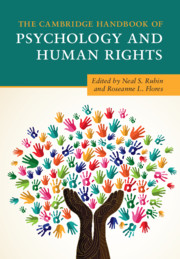Book contents
- The Cambridge Handbook of Psychology and Human Rights
- The Cambridge Handbook of Psychology and Human Rights
- Copyright page
- Dedication
- Contents
- Figures
- Tables
- Boxes
- Contributors
- Acknowledgments
- The Core International Human Rights Instruments and Their Monitoring Bodies
- Universal Human Rights Instruments
- Sustainable Development Goals
- Glossary of United Nations and Psychology Acronyms in the Handbook
- Introduction
- Part I History of Human Rights
- 1 How Fear and Hope Shaped the Universal Declaration of Human Rights
- 2 Human Rights Developments from the Universal Declaration to the Present
- 3 Connecting Human Rights and Psychological Ethics in a Globalizing World
- 4 A Historical Narrative of Psychology Engaging Human Rights within the Framework of the United Nations
- Part II The Intersection of Psychology and Human Rights
- Part III Contemporary Issues in Psychology and Human Rights
- Part IV Teaching, Research, and Training in Psychology and Human Rights
- Part V Future Directions
- Index
- References
1 - How Fear and Hope Shaped the Universal Declaration of Human Rights
from Part I - History of Human Rights
Published online by Cambridge University Press: 02 October 2020
- The Cambridge Handbook of Psychology and Human Rights
- The Cambridge Handbook of Psychology and Human Rights
- Copyright page
- Dedication
- Contents
- Figures
- Tables
- Boxes
- Contributors
- Acknowledgments
- The Core International Human Rights Instruments and Their Monitoring Bodies
- Universal Human Rights Instruments
- Sustainable Development Goals
- Glossary of United Nations and Psychology Acronyms in the Handbook
- Introduction
- Part I History of Human Rights
- 1 How Fear and Hope Shaped the Universal Declaration of Human Rights
- 2 Human Rights Developments from the Universal Declaration to the Present
- 3 Connecting Human Rights and Psychological Ethics in a Globalizing World
- 4 A Historical Narrative of Psychology Engaging Human Rights within the Framework of the United Nations
- Part II The Intersection of Psychology and Human Rights
- Part III Contemporary Issues in Psychology and Human Rights
- Part IV Teaching, Research, and Training in Psychology and Human Rights
- Part V Future Directions
- Index
- References
Summary
Two sentiments governed the postwar world: fear and hope. These two feelings dominated the debates that gave birth to both the Charter of the United Nations and the Universal Declaration of Human Rights. The League of Nations had failed. Leaders had expressed the desire for a world grounded in human rights but could not agree on what that meant or whether individual rights trumped the sovereign rights of nations. The UN Charter reflected these concerns, recognizing human rights but leaving their scope undefined. No precedents existed to guide the work. A committee of eighteen nations, chaired by Eleanor Roosevelt, accepted the unprecedented assignment of defining basic rights for all people everywhere. After consulting with noted jurists, philosophers, and social justice organizations, the committee set out to draft a document that would recognize the horrors of war and engender a commitment to peace. They envisioned a world governed more by hope than by fear. It was hard work. The debate was punctuated by escalating Cold War politics. A legally binding document seemed out of reach. All efforts turned instead to securing a declaration of human rights, which ultimately paved the way for legally binding commitments and energized a budding human rights movement.
Keywords
- Type
- Chapter
- Information
- The Cambridge Handbook of Psychology and Human Rights , pp. 11 - 24Publisher: Cambridge University PressPrint publication year: 2020
References
- 1
- Cited by

